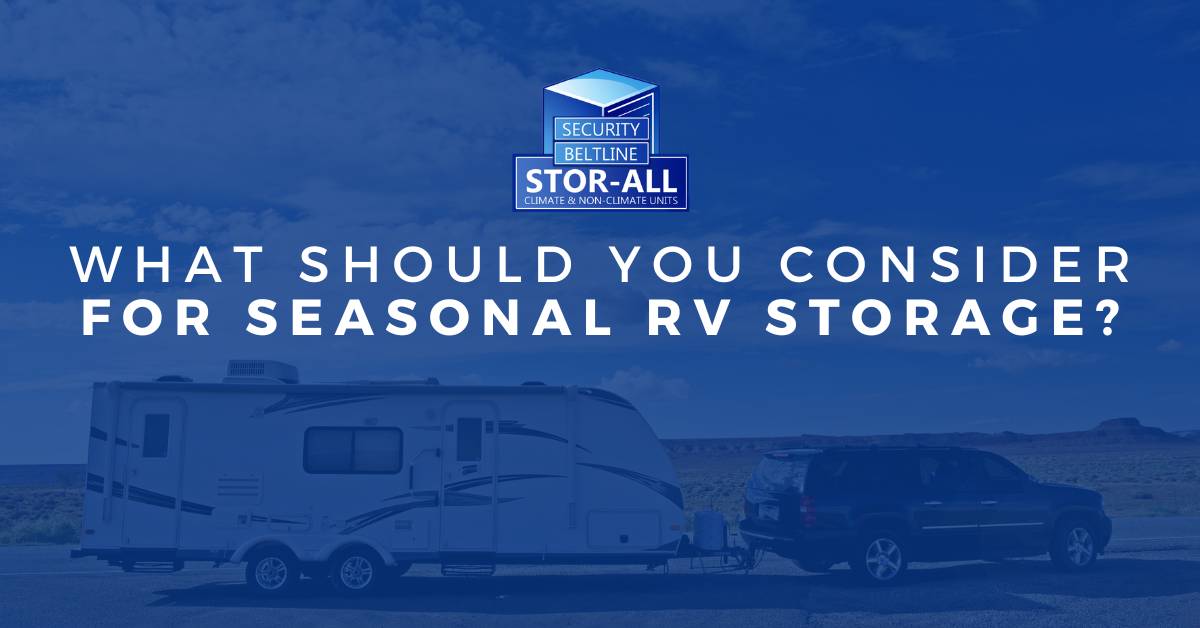
What Should You Consider for Seasonal RV Storage?
As summer wanes and cooler months approach, you may be considering how to store your RV. For seasonal storage, you can choose to store your RV in a facility, on a private lot or in a community. However, there are many factors that can influence your decision. These factors can include security, laws and other circumstances.
Let’s jump into what you should consider for seasonal RV storage.
You Should Always Consider Security Measures
Security is one of the main arguments for choosing a professional storage facility over your own property when keeping your RV. Regrettably, RVs kept on private properties or in communities have become targets for theft and vandalism. Both video monitoring and electronic gate entry should be available at a professional storage facility if you choose to pick a facility for seasonal storage.
Do You Know the Laws for RV Storage in Your Area?
Unfortunately, both seasoned and fresh RV owners can discover that parking their vehicles on their land can violate local laws and HOA policies. The cost of storing your RV on your own property in your area may also be more than at a storage facility.
Additionally, you could discover that parking an RV in your driveway consumes valuable space and becomes difficult. It might be more practical to keep your RV close to a road you use frequently, or a location you visit often, like a summer campsite.
How You Should Prepare for Seasonal RV Storage
Following a checklist is crucial to avoiding any surprises when you return to your RV, regardless of where or how you keep your RV. Some of the accessories can even help your RV last longer. Here is a list of things to do before putting your RV in storage:
- Enforce Additional Security: Take into account securing your RV further. Specifically, a hitch lock will be included for a travel trailer. Consider modifying the entry locks for an RV that can be driven. Even when parked in a storage facility with its own security procedures, it could be wise to add an additional layer of protection.
- Remove Any Foods: All food items should be removed from your RV. Also, clean the refrigerator and freezer. Dry commodities like pasta, sugar, flour and other items are included. Additionally, give your refrigerator and freezer a good cleaning and keep both doors ajar to allow air to circulate.
- Remove Anything of Value: As previously stated, RVs are prime opportunities for break-ins and theft. Whenever leaving your RV, you should remove all things of value, including papers and expensive items.
- Turn Off Propane and Protect Energy Sources: We recommend that you make a battery care plan if your RV can be driven. You must have a strategy for maintaining both your house and chassis batteries; for example, owners of towed RVs require a house battery plan.
You Decided On Where to Store Your Vehicle. Now What?
You never want to leave an RV for too long, no matter where it is parked. Try to make a monthly visit to your RV that is being stored. What is your checklist for maintenance?
- Run the generator: Start your onboard generator if you have one, and leave it running for 15 minutes.
- Examine the batteries in the chassis: Start your RV and check the chassis battery to see whether it can be driven.
- Check for deterioration or pests: You don’t know everything that happens while your RV is stored. Whenever you visit, you should make sure that nothing is amiss, including potential deterioration or pest problems.
Are you looking for seasonal storage for your RV? Contact us today or visit one of our locations in Mobile to reserve your spot for RV storage! Also read our blog on Things You Should know About RV Storage!
Services Offered at Beltline & Security Stor-Alls:
Climate Controlled Storage | Non-Climate Controlled Storage | RV Storage | Boat Storage
